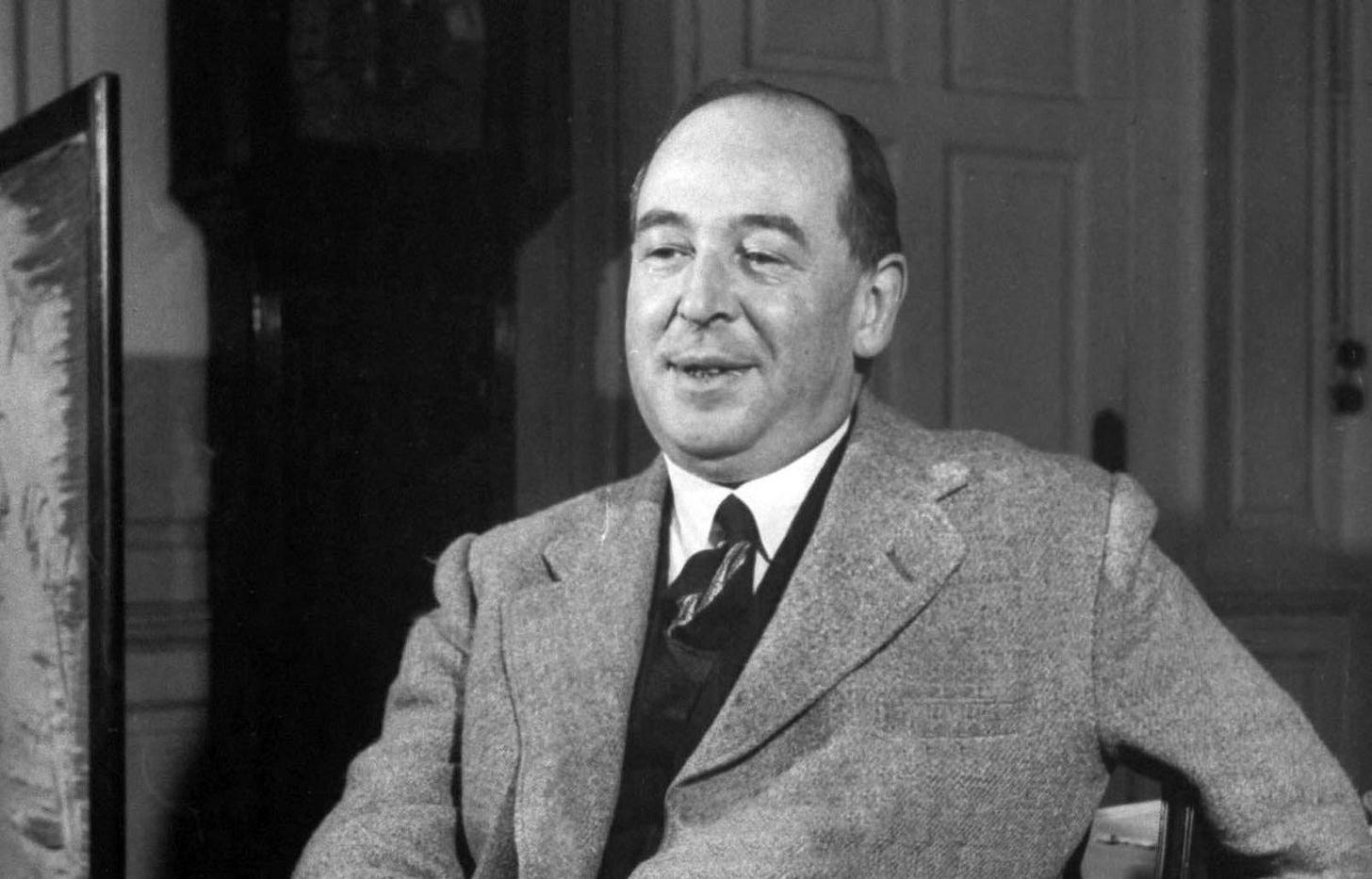C. S. Lewis’s Moral Litmus Test: On Money, Sex and Love
The one way to evaluate the heavenly potential of your life choices
Recently, I saw that a very prominent Christian writer on Substack post that sex and money, in addition to a few other areas, are treated as taboo topics in Christian circles but shouldn’t be. I’m paraphrasing, but he essentially explains that we should reclaim and reposition them within a proper moral order.
I generally agree; we shouldn’t shy away from the good that God has made.
Sex is a beautiful expression of love; ordered towards the total self-giving love of a husband to his wife, and wife to her husband. It’s designed for bearing of children, the possibility of new life, and the growth of Christian families.
Money, similarly, is a tool used to support our families, ourselves, and our communities. With it, great good can take place throughout the world. It feeds the hungry, clothes the naked, and shelters the homeless. It’s a basic necessity for the average western family today. Without it, we can’t adequately care for our loved ones.
With that said, we can’t gloss over recognizing that both sex and money can be perverted towards evil, damaging our souls.
As a sheepdog’s tooth promises protection for its flock, the wolf’s tooth promises death. It’s not the tool itself, but how the brokenness of our humanity exploits the use of it towards our own will, rather than the will of our Creator.
Reading The Great Divorce by C. S. Lewis again recently brought this to the forefront of my mind—but to an entirely new level that’s worthy of discussion.
The Perversion of Money and Sex
He writes:
“But you and I must be clear. There is but one good; that is God. Everything else is good when it looks to Him and bad when it turns from Him. And the higher and mightier it is in the natural order, the more demoniac it will be if it rebels.”
C. S. Lewis tells us that what determines what is good is its alignment with God’s will. But when do things lose their goodness? When they turn away from God.
On the night shortly before Jesus’s crucifixion, a woman anointed Jesus with an expensive perfume. The fragrance filled the room, a profound act of worship and love. However, Judas reacted with anger, demanding “Why wasn’t this perfume sold and the money given to the poor?”
His words seemed righteous, but his heart was not. The Gospel of John reveals Judas’s true motive: he was a thief; caring not for the poor but for himself. Jesus’s response to Judas is illuminating, and likely unexpected to the disciples in the room. “Leave her alone,” He replied.
“It was intended that she should save this perfume for the day of my burial. You will always have the poor among you, but you will not always have me.” Jesus reoriented the focus from the material to the divine, from the wealth to the eternal truth of His presence and sacrifice.
The act of the woman, motivated by pure love and devotion, was good because it was directed towards God. In contrast, Judas’s concern, though seemingly noble, was tainted by selfishness and deceit. This example illustrates what can happen with anything, be it sex, money, or anything else, when our best intentions are pulled away from God.
Now, let’s consider sex, a gift from God intended to bring together husband and wife in a most intimate and sacred way. Yet, outside of the bounds of marriage (and even within them in some cases), it can be perverted. Paul addresses this in his first letter to the Corinthians as he tells them to shun sexual immorality, saying:
“[E]very other sin which a man commits is outside of the body; but the immoral man sins against his own body. Do you not know that your body is a temple of the Holy Spirit within you, which you have from God? You are not your own; you were bought with a price. So glorify God in your body.”
Sexual immorality dishonors God’s divine intention for our bodies, which are meant to be “temples of the Holy Spirit.” When we commit acts that are disordered from His design, we commit a grave act against God Himself.
The Price of Intentions
Do you give charity in order to be recognized for your “goodwill?” The Pharisees did that, and Jesus condemned them for their hypocrisy. In Matthew 6:2, He said:
“So when you give alms, sound no trumpets before you, as the hypocrites do in the synagogues and in the streets, that they be praised by men. Truly, I say to you, they have their reward.”
Their acts of charity were not about serving others but about serving their own egos, seeking the praise of men rather than the approval of God.
Consider also the story of Ananias and Sapphira in Acts 5. They sold a piece of property and kept back part of the proceeds for themselves, while pretending to give the full amount to the apostles. Their deception wasn’t just a lie to the apostles but a lie to the Holy Spirit.
Their actions were not about generosity but about seeking status within the early Christian community. The consequence of their deceit was severe—both fell down dead at Peter’s feet, serving as a harsh reminder that God sees beyond our outward actions to the true intentions of our hearts.
Our motives matter deeply to God. In Matthew 6:1, Jesus warns, “Beware of practicing your piety before men in order to be seen by them; for then you will have no reward from your Father who is in heaven.”
The heart of the matter is always the heart itself. Do we love God with all our heart, soul, mind, and strength, or do we seek to use our piety, our acts of charity, our very spirituality, as a means to gain something for ourselves?
Let’s return to the example of sex and money. Both can be holy and good when directed towards God’s purposes—sex within the covenant of marriage as a gift of unity and procreation, money as a tool to bless others and advance the Kingdom. Yet, when we detach them from their divine purpose, when we seek pleasure or power or security apart from God, they become idols.
The Apostle Paul writes in 1 Timothy 6:10, “For the love of money is a root of all evils; it is through this craving that some have wandered away from the faith and pierced their hearts with many pangs.” It’s not money itself but the love of it that corrupts.
We are reminded of the rich young ruler in Mark 10, who approached Jesus asking what he must do to inherit eternal life. Jesus, knowing his heart, told him to sell everything he had and give to the poor, and then follow Him. The young man went away sad because he had great wealth. His love for his possessions was greater than his desire to follow Christ.
The Perversion of Love
Now, let’s go back to C. S. Lewis. In his very next line in The Great Divorce, he continues, taking it even another step further:
“It's not out of bad mice or bad fleas you make demons, but out of bad archangels.“
In this view, anything, even what’s perceived as good has the potential to be evil, just as demons were once angels. It’s not even limited to our controversial topics like sex and money–even something as innocent as love can be twisted from the will of God.
Think about it: love, the very essence of God’s nature, can become a snare, diverting our gaze from the Divine.
In The Great Divorce, there's a particularly disheartening scene that perfectly illustrates this point in the very same chapter. It involves a mother who is desperate to see her son, Michael, in heaven. Ever since Michael’s death, her longing to be reunited with him has consumed her.
When she finally encounters a bright spirit in heaven, she's insistent on seeing Michael. But the spirit gently explains that it’s not possible—at least, not yet.
The spirit encourages her to let go of this possessiveness, to trust in God’s plan. Only by doing so can she hope to be reunited with Michael in a way that is truly healthy and holy. Yet, she struggles with this, unable to loosen her grip on the distorted love she holds. She lashes out, saying:
“I don’t believe in a God who keeps mother and son apart. I believe in a God of love. No one has a right to come between me and my son. Not even God. Tell Him that to His face. I want my boy, and I mean to have him. He is mine, do you understand? Mine, mine, mine, for ever and ever.”
Pushed further, as the spirit doesn’t give in to her demands, she makes a damning statement:
“I hate your religion and I hate and despise your God.”
The main character of the story, being guided by a spirit he calls the Teacher, witnesses this discourse, claiming that the poor woman’s love for her son was “an excess of love.”
The teacher rejects this idea, revealing:
“There was no excess, there was a defect. She loved her son too little, not too much. If she had loved him more there’d be no difficulty. I do not know how her affair will end. But it may well be that at this moment she’s demanding to have him down with her in Hell. That kind [people like her] is sometimes perfectly ready to plunge the soul they say they love in endless misery if only they can still in some fashion posess it.”
This interaction starkly illustrates how even something as inherently good as a mother's love can become twisted when it turns away from God. Love, when detached from its divine source, becomes a snare rather than a gift.
It reminds us that not only should areas like sex and money be aligned with and subordinate to God’s will, but inherently good things like our love must be, as well. Otherwise, like this mother, determined to have things our way rather than His, we risk getting exactly what we ask for—our way. And when we do, it could result in us being lost from God’s grace forever.
Ultimately, it’s about surrender; laying down our desires, our plans, our very lives, at the feet of Jesus, trusting that His ways are higher and better than our own.
In this surrender, we find freedom. When sex is expressed within the bounds of marriage, it becomes a profound act of love and communion. When money is used as a tool for generosity, it becomes a blessing to us and to others. When our actions are motivated by a genuine love for God and others, they become acts of worship.
Let us examine our hearts, align our intentions with God’s will, and use every gift He has given us for His glory.
In doing so, we will not only avoid the pitfalls of idolatry and self-service but will experience the fullness of life that Jesus promised. “I have come that they may have life, and have it to the full” (John 10:10).
Yours in Christ,
Josh







